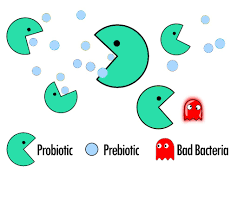If a prebiotic and a probiotic go head to head, who will win?
Well, that’s a lot like asking whether an apple is better than an orange … they are different so it’s not necessarily a true comparison.
They sound similar, but each are very different and have different roles in our digestive system (aka our gut). Stick with me for a minute, even if this begins to sound complicated.
Prebiotic is essentially a type of dietary fiber that feeds or fuels the beneficial bacteria in our gut. It is a non-digestible, carbohydrate part of food that goes through the small intestine undigested and is fermented when it reaches the large colon where it feeds the bacteria colonies.
Probiotics are live beneficial bacteria naturally created by the process of fermentation that keep our gut in working order. 80% of our immune system is located in the gut, so keeping it healthy impacts your entire well-being.
A really great analogy I recently heard is this-
Think of a garden. The probiotic is the seeds that grow into the plants. The prebiotic fiber is the fertilizer that helps the seeds flourish.
So basically a prebiotic is helpful in increasing probiotics which help reduce disease and increase well being.
OK, so what exactly food wise, is a prebiotic and what is a probiotic?
Probiotics can be found in food or in pill form. From a food perspective- these are fermented foods like sauerkraut, kefir and kimchi. They must be found in the refrigerator case (keeping the good bugs alive), not in a shelf-stable can where the good bugs cannot live.
Prebiotic (fiber) can be found in foods like banana, apple (with skin on), asparagus, dandelion greens, barley, raw garlic and onions, and Jerusalem artichoke. Or these can be found in supplement form as well.
Why take a supplement versus eating real food?
Our modern diet is high in processed foods and sugar so it’s pretty helpful to get these into our diet one way or another to help stabilize our guts and improve our health. But not all of us are eating (or have the taste for) fermented foods or even foods high in fiber; that’s where supplementation is helpful.
It’s important to understand that probiotics are fragile and can be killed by heat and stomach acid. There are hundreds of types available but they must ‘arrive alive‘. Purchase supplements from the refrigerator section of the pharmacy.
Prebiotic fiber is more hearty and not affected by heat and digestive juices so are more shelf friendly.
Key Takeaways: Probiotics are great for the gut and our entire immune system. Keep in mind that everyone is different so not everyone needs one and the same one won’t work for everyone. Plus, you don’t need to take prebiotics for probiotics to work, but it may make the probiotics more effective.
Ready to go a litter deeper? Reach out and let’s connect on your gut health!
0

